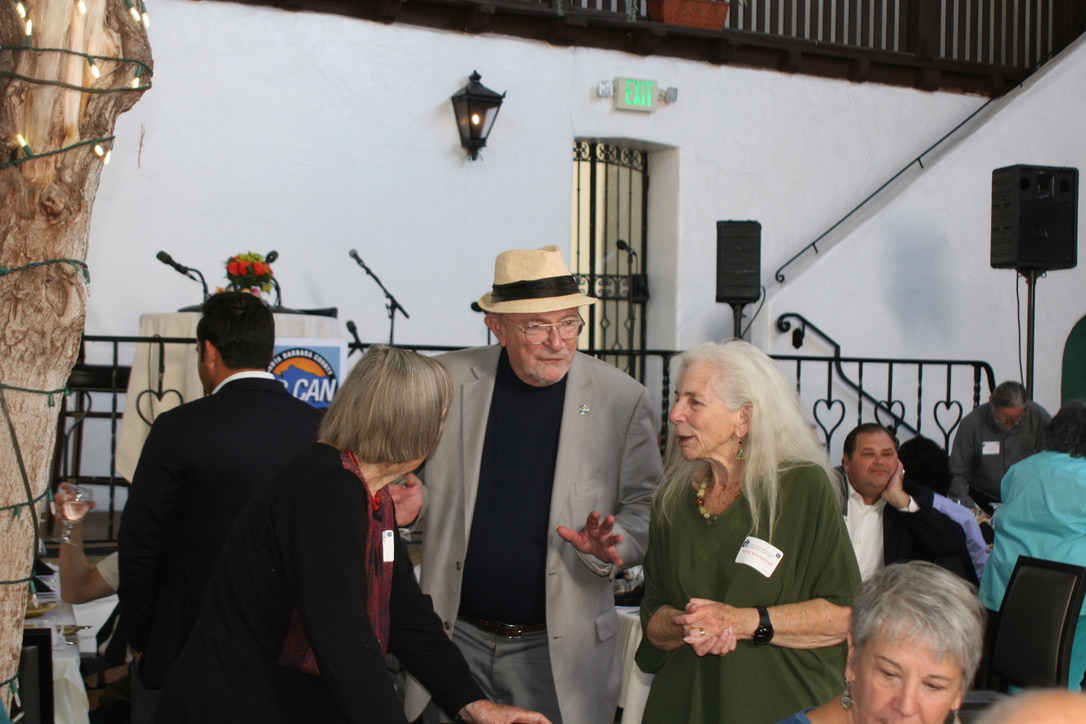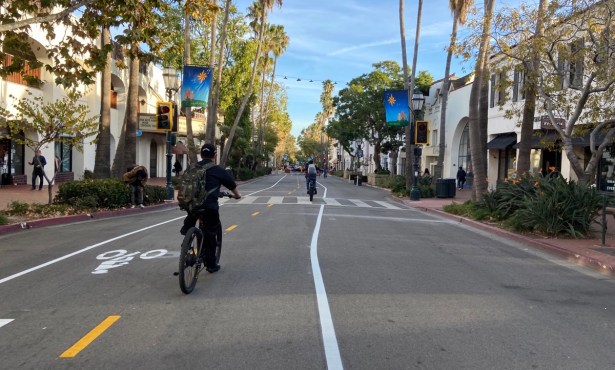From Supervisor Joan Hartmann’s opening remarks at Flacks Fest held on November 12.
A Dangerous Professor
Honoring Dick Flacks at the Flacks Fest

Welcome to Flacks Fest, an event to honor Dick Flacks: activist, advocate, and academic — and, as Nick Welsh wrote in a tribute piece on Dick’s retirement in 2006, UCSB’s “most dangerous professor.” Dick’s journey is one of mythic proportions. We recount myths again and again because they anchor us in a larger narrative and they inspire us to greater achievement ourselves. So, to recount what many know, but bears repeating:
Dick was born in Brooklyn to two teachers, both Russian Jewish immigrants, union organizers, and communists, who were later fired in the anti-communist frenzy. Dick, “a red diaper baby” became disillusioned with communism and began a quest to shape his own ideology — one he could really live by. He met and married Mickey Hartman, a woman with a background uncannily similar to his own, and they began their quest together, committed to values of social justice, nonviolence, and radical change.
They left the stuffy East Coast for the Midwest where Dick pursued his sociology degree from the University of Michigan — and in 1962 teamed up with Tom Hayden to remake the Students for a Democratic Society and draft the Port Huron Manifesto. Also referred to as the “Agenda for a Generation,” the manifesto was prescient in 1962 for its commitment to racial justice, nonviolence, and call to locate the movement for social change in universities (rather than labor unions).
The Point Huron Statement helped set the stage for the Great Society of the mid-’60s, the anti-war movement, the broader counter-culture movement, and college campus activism.
It also embraced what we now refer to as “intersectionality” — that civil rights, labor rights, peace and nuclear disarmament are inextricably linked and that “participatory democracy” was the key to progress on each. It was the way for everyone to get involved, overcome alienation, reconcile communitarian and individual impulses, and actively engage as equals in all the different aspects of life — work, school, clubs, houses of worship. It wasn’t limited just to politics.
In 1964 Dick took a tenure-track position at the highly prestigious University of Chicago where he continued his activism and catapulted to prominence with his first book, Liberated Generation. Then, a man posing as a reporter brutally attacked him, shattering his skull in two places and nearly severing his right hand. In 1969, Dick and Mickey decided to head west to UC Santa Barbara for a more easy-going lifestyle, some peace and quiet. And then, all hell broke loose. For 10 years — starting with the blowout of Union Oil’s Platform A, the worst oil disaster in the world to that time, the burning of the Bank of America building, bomb threats, police presence, and every type of counter-culture hippie imaginable — unrest ruled in Isla Vista.
During this time, Mickey and Dick started the Thursday Club, inviting activists to their living room to forge new organizations and cultivate a constructive voice to counter the chaos and violence. Their living room was the crucible that formed modern Santa Barbara. It was so successful because Dick and Mickey recognized that social change happens at the speed of relationships. The Thursday club produced alternative community schools, medical clinics, food co-ops, environmental groups, and even the progenitor of the Indy. It also transformed Santa Barbara city government, turning the council from red to bluish with a plan for slow-growth. Then, turning attention to the county as a whole, they formed SBCAN, to bring some of the progressive ideals and resources north where they are desperately needed. Those impacts, like so many that the Flacks invested in, are realized long-term and some are just beginning to be felt. Small-scale changes that align with a coherent vision can have profound impacts.
I don’t think we can ever fully appreciate the impact of Dick and Mickey Flacks. It is so extensive and so subtle — woven into the fabric of our community. They didn’t call attention to themselves. They created the space for participatory democracy and the sense of possibility to flourish. They supported others to carry the banner.
I’d like to recount my own case as an example. When I was considering running, they invited me, an unknown to them, to their home for a celebration. Although I had served on a few boards, I wasn’t known and didn’t know many people in Santa Barbara.
I drove up and the house was unlit, quiet with a bunch of boxes on the front porch with clothes falling over the sides. I drove around the block a few times before getting up the courage to go in. (I learned later that the boxes were for a drop-off to collect coats for people in need). There I met people who stepped in to help me get my bearings and who have continued to serve as key advisors to this very day.
During my second campaign, a professor colleague of Dick’s who was not a fan of the Democratic Party, recruited a former student who lived in I.V. to run against me. It was a very delicate matter, and Dick was my chief consultant helping me navigate that highly sensitive situation so I was able to win that election.
I owe more than I can ever express, and I am just one of so many, many people whose efforts Dick has facilitated in ways that most people don’t even know about.
I began by saying that we recount myths to anchor us to a larger narrative. Dick and Mickey Flacks have anchored our county to the historical narrative of the ’60s and transformed the chaos of that time into countless positive, constructive, and influential structures that will endure long after any of us. They created a room where participatory democracy flourished and good ideas were born and, more than that, blossomed into tangible organizations that have made our community so much better.
In today’s world of relentless self-promotion, and “influencers,” we tend to think that the limelight is the only light worth seeking. The simple truth is that achievement often occurs off the public stage, in living rooms. Great things, whose origins most of us have never really considered, trace their beginnings to people such as Dick Flacks, who has dedicated his life to improving our own. That is an achievement we might all aspire to.



